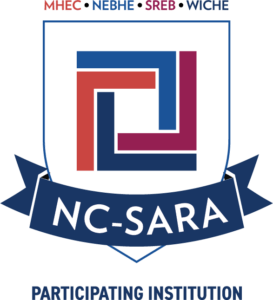State Authorizations
State Authorization Compliance
Federal and state regulations require that all institutions of higher education comply with existing state laws regarding distance learning. An Institution that offers distance/online education must comply with the laws of its home state as well as the laws of any host state where educational experiences are offered. Regulations associated with federal student financial aid programs include the following requirements. The institution must make available for review to any enrolled or prospective student upon request, a copy of the documents describing the institution’s accreditation and its State and Federal approval or licensing. The institution must provide its students or prospective students with contact information for filing complaints with its accreditor and with its State approval or licensing entity and any other relevant State official or agency that would appropriately handle a student’s complaint. The institution must also disclose educational requirements for programs that lead to professional licensure or certification regardless of modality.
NC SARA
Spring Hill College has been approved to participate in State Authorization Reciprocity Agreements.
This membership allows Spring Hill College to accept distance students from most states across the United States. From the list below, please review the status of the state where you are currently residing for any special restrictions which may exist for your academic program of interest. State Authorization is a complex and dynamic environment. Prospective students should check this site often for updates.

Prospective Online Students
Admission of out-of-state applicants to an online degree program or individual online courses offered by Spring Hill College is dependent upon the College’s ability to secure authorization from the applicant’s state of residence, if such authorization is required. Out-of-state applicants are advised to refer to specific state links below to determine whether the College is authorized in a particular state.
Accreditation Agency
- Southern Association of Colleges and Schools Commission on Colleges
- Alabama Commission on Higher Education
Consumer and Student Complaints
Spring Hill College students must first use the College’s applicable internal complaint or review policies and procedures prior to filing a complaint with a state agency. If a student has a complaint and would like to contact the appropriate agency in the state where they reside, click on your state below for information on where to address the complaint. If a student has completed the internal institutional grievance process and the applicable state grievance process, they may appeal non‐instructional complaints to the ACHE NC SARA
Professional Licensure Disclosure Statement
All applicable programs prepare students to sit for licensure in Alabama. In order to comply with U.S. Department of Education regulations regarding distance education and professional licensure Spring Hill College is required to make the following disclosure with respect to professional licensure outside the state of Alabama. Please contact applicable licensure board(s) in any state you may want to pursue licensure prior to beginning the academic program.
The BSN degree at Spring Hill College is not designed to meet any specific licensure/certification requirements, the program is accredited by the Commission on Collegiate Nursing Education (CCNE) and graduates may sit for the National Council Licensure Examination (NCLEX). The National Council of State Boards of Nursing (NCSBN) develops the National Council Licensure Examination to test the competency of nursing school graduates in the U.S. and provides licensure.
The Baccalaureate Degree Program in Nursing at Spring Hill College is accredited by the Commission on Collegiate Nursing Education (http://www.ccneaccreditation.org).
The Spring Hill College Division of Nursing is hosting an evaluation of the baccalaureate degree programs (BSN) with the Commission on Collegiate Nursing Education (CCNE) on September 20-22, 2023. If you would like to provide comments to the site visitors for review regarding the BSN program, please send these to: thirdpartycomments@ccneaccreditation.org. All written third party comments must be received by CCNE by August 31, 2023.
B.S. in Education: Early Childhood, Elementary and Secondary Education
M.A.T in Elementary and Secondary Education provide teacher certification through the Alabama State Department of Education (ALSDE). The initial and standard certificate issued once the basic requirements for a teaching license are met is the Professional Educator Certificate (Class B). Please contact the applicable licensure board(s) in any state you may want to pursue licensure prior to beginning the academic program.
